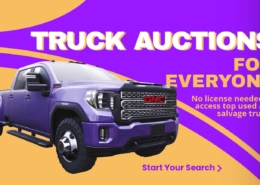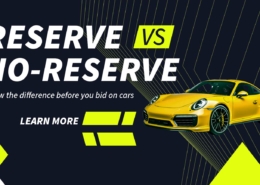Navigating the world of wholesale vehicle auctions can be daunting, especially without a business or dealer’s license. However, acquiring vehicles through online wholesale auctions tailored for individuals and businesses lacking traditional credentials is possible. This guide will walk you through the process, ensuring you can secure your next vehicle quickly and confidently.
Accessing Vehicles at RideSafely: No License Necessary
Simplified Shopping Experience
The most straightforward method to purchase vehicles at auctions without a dealer’s license is through RideSafely. This platform allows you to filter search results by make, model, condition, location, and budget, aligning perfectly with your needs, including salvage repairable vehicles and clean title cars. With user-friendly and powerful navigation, securing a great deal on your ideal vehicle is just a few clicks away.
Here’s why RideSafely has been a trusted name in the industry since 2003:
For a broader understanding of what’s available, you might want to Explore the Diverse Range of Vehicles Available at RideSafely.
Understanding Auction Laws
State Regulations on Vehicle Auctions
It’s important to recognize that the laws of the state where the vehicle is located dictate auction participation rules—not the residence of the buyer. Various states permit individuals and entities to purchase vehicles from auctions conducted by dealers, private sellers, and other participants.
Global Opportunities for Exporters
Bridging US Vehicles to the Global Market
For international buyers, partnering with RideSafely offers a seamless solution. With the necessary credentials in place, RideSafely can assist you in bidding, winning, and shipping vehicles from the US to your destination port. This service is invaluable for exporters looking to tap into the expansive US market.
The Appeal of Salvage Vehicles
Buying and Renovating Salvage Titles
Salvage titles are often misunderstood. A vehicle receives a salvage title when an insurance company deems it a total loss, yet it can still be a worthwhile purchase if properly repaired. Here’s a breakdown of what a salvage title entails and how to navigate this process.
Purchasing a salvage-title vehicle requires a bid card or dealer license in many states. Automotive enthusiasts and repair experts often acquire these vehicles for restoration projects or parts. Typically, insurance companies brand a vehicle as salvage when they declare it a total loss.
For more details on the advantages, consider reading about the Top 8 Benefits of Buying a Salvage Car from Online Auto Auctions.
Rebuilding and Rebranding
Most jurisdictions provide a legal pathway to rehabilitate a salvage vehicle. Once repaired, the vehicle can receive a new title, making it eligible for licensing and insurance for road use. This route is particularly beneficial for those with the capability to invest ‘sweat equity’ and less financial capital.
For tips on transporting your project car, check out our Guide to Transporting Your Salvage Vehicle Post-Auction.
Decoding Salvage Titles: A Comprehensive Guide
For a comprehensive understanding of salvage titles and their implications, consider exploring resources such as Decoding Salvage Titles: A Buyer’s Guide to Identifying Common Damage. Such guides offer invaluable insights into assessing vehicle conditions and making informed decisions.
Advantages of Online Wholesale Auctions
Economical Purchasing Options
Wholesale car prices are typically lower than retail prices. This price difference is due to dealers purchasing vehicles in bulk, reducing per-unit costs. Retail prices, conversely, are higher to cover the costs associated with marketing, reconditioning, and maintaining showrooms.
Who Buys Wholesale Cars?
- Dealers: Many dealers buy wholesale cars to replenish their inventory with a variety of models, offering customers a wide selection at competitive prices.
- DIY Enthusiasts: Individuals often purchase cars at wholesale prices to either refurbish and use themselves or to resell for a profit after making necessary improvements.
Maximizing Value in Auctions
Online vehicle auctions present opportunities to acquire vehicles at competitive prices. Whether you’re bidding directly or through an intermediary like RideSafely, the potential to land a significant deal is substantial.
Budgeting for Total Costs
Prior to participating in auctions, it’s crucial to account for all associated costs, including fees, shipping, and potential repairs. Understanding these expenses upfront allows for effective budgeting and strategic bidding. To start your auction journey, visit our FAQ section under How do I start getting ready to bid?
Conclusion: Seize the Opportunity
Embarking on your vehicle auction adventure can lead to exciting opportunities and significant savings. With the right knowledge and resources, accessing wholesale vehicle auctions without a dealer’s license is not only feasible but also potentially rewarding. Equip yourself with the necessary information, choose the right platforms like RideSafely, and prepare to explore the vast world of vehicle auctions. Good luck on your journey to finding the perfect vehicle at an unbeatable price!
FAQs: Wholesale Auctions Without a License
What do I need to participate in a wholesale vehicle auction without a dealer’s license?
To participate in auctions at RideSafely, all you need is a valid driver’s license. Registration on RideSafely is free and accessible to everyone, as we hold all necessary licenses to facilitate your participation. If you plan to export the vehicle you purchase, a valid passport will also be required to complete the transaction.
How can I find out if I’m eligible to buy at a particular auction?
Eligibility can vary by state and auction house. It’s crucial to research the laws in the state where the auction is held, as some states have specific rules about who can purchase vehicles at auctions. Auction house websites often have sections detailing bidder requirements. For instance, Texas customers cannot purchase vehicles from Texas-based auctions through RideSafely, but they are welcome to bid on items located outside of Texas. Please contact us for any specific questions regarding eligibility.
What are the risks of buying a vehicle at a wholesale auction?
Risks include purchasing a vehicle with hidden damage or mechanical issues. Since vehicles are often sold as-is, conducting a thorough review of the vehicle’s condition report or getting a pre-auction inspection where available is crucial. Be aware that some salvage title vehicles may require extensive repairs to be roadworthy.
How do I prepare for an auction?
Preparation should include researching the types of vehicles available, understanding their market value, and setting a strict budget for your bids. If possible, attend a few public auctions as an observer to get a feel for the process. Also, ensure you have the means to transport your vehicle from the auction site.
Can international buyers participate in US-based wholesale vehicle auctions?
Yes, international buyers can participate, but it is essential to work with an auction company that offers services like bidding assistance and international shipping. You’ll also need to consider import taxes, shipping costs, and other logistics.
What should I know about salvage titles?
Vehicles with salvage titles have been declared a total loss by insurance companies, usually due to damage or theft recovery. While they can be bought at lower prices, they may require significant repairs. Check local laws regarding the inspection and registration of salvage vehicles, as these can vary greatly.
How can I ensure I’m getting a good deal at a vehicle auction?
To ensure you’re getting a good deal, research vehicle prices before the auction and set a maximum bid based on their market value and condition. Consider all associated costs, such as auction fees, transportation, and potential repairs. Always aim to view vehicle history reports or seek expert assessments when available.
Where can I learn more about specific state regulations for vehicle auctions?
For detailed information on state regulations, visit the Department of Motor Vehicles (DMV) website of the state where the auction is located or consult legal resources that provide summaries of state auction laws. Many auction houses also provide links to relevant legal requirements.
How do I handle payment and vehicle pickup after winning a bid?
Typically, auctions require payment within a specified timeframe after the sale, often through wire transfer or a certified check. You will also need to arrange for the vehicle’s pickup, which might involve hiring a transport service if you cannot pick up the vehicle yourself.
Are there any resources for first-time auction participants?
Yes, many auction houses offer guides and tutorials on their websites. Additionally, online forums and automotive blogs can provide tips and experiences from seasoned auction goers. It’s also beneficial to consult with automotive experts or trusted advisors who have experience in vehicle auctions.






